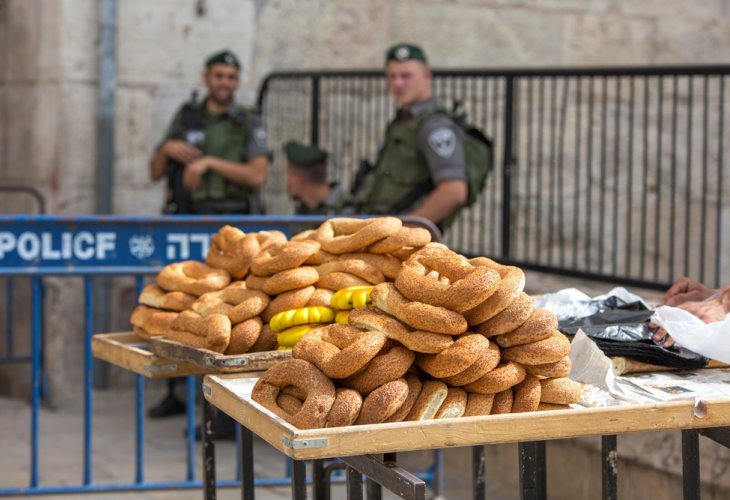Will the IDF Allow Soldiers Chametz on Passover? What About Prisons and Hospitals?
The Ministry of Health insists on allowing chametz in hospital areas, the IDF postpones its decision to next year, and the IPS is confident: "Observant prisoners should not be harmed." Here's the current situation.
 (Illustrative photo: shutterstock)
(Illustrative photo: shutterstock)In less than 30 days, Passover will take place, and as every year, the usual discussion arises: Will chametz be allowed in hospitals, what will happen in prisons, and what can be expected in the IDF?
As always, there is the majority of the public that understands the importance of helping those who wish to observe the law. They understand that nothing will happen to them if they avoid eating pita in certain areas for a week. On the other hand, there are various forums and organizations filing petitions and provocations, trying to change the situation under the guise of equality and pluralism.
So what is really expected this upcoming Passover? We went to investigate.
Hospitals: "The Guards Politely Request"
About two years ago, the High Court ruled that hospitals cannot prohibit chametz during Passover. Judge Uzi Fogelman argued then that banning food during the holiday infringes on patients' rights, autonomy, and freedom of religion.
However, it now turns out that some hospitals are attempting to respect the feelings of those who observe kosher and prevent chametz entry. For instance, at Hadassah Hospital, a decision was made to politely ask staff not to bring non-kosher Passover food during the holiday week. Also, hospital security will be instructed to politely request that patients and visitors avoid bringing chametz onto hospital premises.
 (photo: shutterstock)
(photo: shutterstock)Naturally, there were those who objected, and in the secular forum, a letter was sent to Health Minister Nitzan Horowitz, claiming these guidelines contradict the Supreme Court ruling. Forum leaders even threatened, "We reserve the right to take all legal steps to enforce the court's decision on the hospital."
An inquiry into the matter shows that other medical institutions across the country are also trying, in various ways, to prevent patients from bringing chametz onto their premises. If the Health Minister accepts the claims of the secular forum and acts to eliminate the issue, the situation where chametz is consumed openly in hospitals may be renewed.
Hidabroot's request for a response from the Ministry of Health has so far yielded no reply. When received, it will be published.
IDF: "Awaiting the State's Response"
The chametz issue in the IDF is no less complex than in hospitals. Until this year, chametz consumption was prohibited in bases, both in the days leading up to the holiday and during it, to ensure the area is free from chametz. Now, the High Court has also addressed this issue, requiring the IDF to explain why chametz cannot be allowed in defined and closed areas. The IDF must also justify why the chametz ban starts before the holiday and not just from the 13th of Nisan, when the burning of chametz occurs.
This demand follows a petition from organizations advocating for religious freedom and equality, the secular forum, and 14 soldiers' parents. They filed the petition after the court ruled hospitals must allow chametz during Passover. The IDF argued that allowing chametz on bases would prevent soldiers from fully observing the law and could harm them inadvertently.
Criticism was expressed in the High Court, with President Esther Hayut stating that "the IDF must find a compromise acceptable to all, allowing those who wish to eat chametz during Passover to do so." The court suggested having guards at dining room entrances to ensure no chametz is brought in, while allowing chametz in soldiers' rooms. Another option proposed was creating special areas for soldiers who observe the chametz ban during Passover.
In a conversation with Hidabroot, the IDF spokesperson reassured that no change is expected this holiday. "The Passover ban on bringing chametz into bases will remain as usual," he stresses. "These orders are legal, authorized, and based on the essential reasoning to ensure the kosher certification of food served to soldiers."
The spokesperson clarifies that the Supreme Court has ordered the state to consider specifying areas where the chametz ban will apply and addressing the timing of regulations going into effect before the holiday. Meanwhile, the court rejected a request for an interim order. "As mentioned, no change is expected this holiday, and the state will present its position to the court as usual."
Prisons: "No Way to Bring in Chametz"
For years, Israeli prisons have strictly prohibited chametz during Passover, and this year will be no different. Previously, a Muslim prisoner petitioned the High Court to instruct the Israel Prison Service to provide bread and chametz for non-Jewish inmates during the holiday. His petition was rejected by the court, noting that the Jewish prisoners in the same section could be offended by chametz.
In response to Hidabroot, IPS spokespersons clarified that "all prisons in the country are chametz-free during Passover. The practice is to sell all existing chametz, and then ensure that no chametz is brought in whatsoever. A prison is a secure facility, and entry is thoroughly checked. There's no way to bring in chametz without the guards' knowledge."

